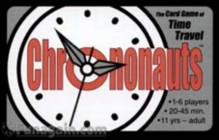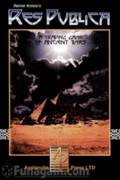

| Last updated: 30 January 2002 | ||||
BridgeThis is, in my opinion, the best of the traditional games played with a 52-card deck. It uses all the cards, and its strategy is to some extent based on reasoning how the cards were dealt based on clues from your partner and opponents. It's quite subtle, but extremely addictive if you keep with it and learn the basic strategy. Unfortunately, I don't play nearly as much as I'd like because it's difficult to find three other people who are interested in playing.I tend to regard Spades, Euchre and Five Hundred as "lite" versions of Bridge, with Five Hundred being the best of the lot (and being very well-suited to three players, too). In July of 1998 I played in my first duplicate bridge tournament with a friend of mine. Considering my novice status, I felt rather pleased that we finished in the middle of the pack. We had a couple of triumphs, and a couple of spectacular bidding errors, but overall it was fun and I hope to play more in the future. I think this is a great game. The American Contract Bridge League has its own Web site.
 ChrononautsFrom the creators of Fluxx (which I've heard much about, but haven't played), in Chrononauts each player is a time traveller trying to accomplish one of several goals. The game has a "board" of 32 cards laid out chronologically, each one being a "linchpin" event which can be flipped (the event it represents being reversed, e.g. preventing the destruction of the Titanic) which causes paradoxes at later points in board. Those paradoxes can be "patched" (by placing special patch cards over them) to create a rewrite of history.One goal - defined by a player's secret identity card - is to create a specific series of events and patches which represents the timeline the player came from, so the player can return home. A second goal - defined by a player's secret mission card - is to collect three special artifacts from various times. Finally, by playing patch cards a player can gain extra cards for his hand, and a hand of ten cards allows one to win. But: There are many bizarre cards in the deck, allowing you to steal artifacts from other players, muck with the timeline, search through the deck (or the discard pile), and even swap hands with other players or force them to assume new identities. So you can plan ahead somewhat, but your carefully laid plans can be easily disrupted. Having cards to be able to foil other peoples' plans is perhaps the best strategy. The game's flow takes a little getting used to (making sure you don't draw too many cards or discard too few), but it plays fast. We played four games in three hours, and enjoyed it quite a bit. If you like a game with moderate strategy, a lot of chaos, and a clever premise, then Chrononauts may be the game for you. I think this is a good game. There is an expansion called Lost Identities, which I have not played.
CribbageThe only 52-card deck game I know of that uses a board, I still like playing this sometimes, and it's probably my favorite of the "match cards in sets or runs" games, because it's much more dynamic: You not only put together a static hand, but you play cards off your opponent during play.I think this is a good game.
Gin RummyA game of matching cards in sets or runs, this is a game I used to play a lot with my mother. It's enjoyable in its way, but I tend to prefer trick-based games like Bridge and Hearts these days.I think this is a good game.
Give Me The BrainCheapass GamesEach player is a zombie who's been resurrected to work in a fast food restaurant. You each have a hand of cards which you want to get rid of. Problem is, you only have one brain (a six-sided die) among you, and some of your cards require that you possess it in order to be played. And even when you play them, you have to make a skill roll or you drop the brain and everyone gets to bid on it (with special bidding cards). The artwork is very funny, and play is pretty fast and funny. Its big drawback, though, is that some players might not even get a turn during the game due to the way the bidding and turn progression rules work. Probably best with no more than four people. I think this is a poor game, though it's perhaps worth a look just for the silliness factor.
 The Great DalmutiWizards of the CoastSupposedly based on a traditional game, The Great Dalmuti involves a deck of 80 cards, 1 one, 2 twos, 3 threes, and so forth up to 12 twelves, plus two jokers. Cards are dealt as evenly as possible, and a play consists of a player playing a set of cards of identical rank. Each successive player can play the same number of cards in successive rank. When the play ends, those cards are removed from the game, and the last player to play leads the next trick. The idea is to get rid of all your cards. Players change seats after each hand according to who went out first, and winners get a small advantage in the next round (plus bragging rights). This game is remarkable because it works best with six-to-eight people (it's not very good with fewer than five), plays very quickly, and can get very silly. Often when I have friends over to game, we will break up our more "serious" games by playing this for a few hands. I suspect that elements of it were based directly on Hearts. The Dilbert Corporate Shuffle game from the same company is essentially the same as this game, only the cards' artwork is not as nice (Scott Adams isn't a good artist), and it includes some needless variants in the cards. I think this is a great game.
HeartsI played this game a lot in college. The basic idea is to get rid of all your hearts, and take as few as possible. Each heart is worth 1 point, and the Queen of Spades is worth 13. The first player to some preset score loses, and the one with the lowest score at that point wins. It's a fast-paced, enjoyable game.I think this is a good game.
Lamarckian PokerCheapass GamesYou can actually get the rules to this game for free from their Web site. This is an interesting poker variant which involves trying to "evolve" your hand into a better hand. Seems to play best with 3 or 4 people. I think this is a good game.
 PitWinning MovesPit is a simple trading game: Each player is dealt (say) 9 cards, and wants to form a set of 9 identical cards by trading with other players. There are two tricks: First, there are no 'turns' everyone makes trades at once. Second, you can only state how many cards you're offering, and they must all be of the same type. So you may offer to Wheat, and you hold them out and shout "Two!" If someone else has two cards to trade, then you could exchange them. Eventually you hope to gain the requisite number of cards, and the first person to do so ends the game and gains points. Moreover, there are two wild cards, the Bear and the Bull; the Bull gives the winner additional points, but the Bear loses its owner points when the game ends. It's a fast, frantic game, good for up to 8 people. The cards could be better-designed, as some trading commodities (in the edition I've played) begin with the same letter (Oranges and Oats, for instance), and the different commodities ought to be printed in different colors. I think this is a good game.
PokerI've never been much of a Poker fan. It always seems a bit too random in the card mechanics, and the bidding aspects just don't appeal to me. (I'm not a gambler, you may be able to tell.) Gin Rummy is more my thing.I think this is an okay game.  Res PublicaAvalanche PressRes Publica contains the best elements of Civilization (trading cards and making sets to build things) without the really annoying aspects (lame combat rules, frustrating limits on building things on the board; in short, the board is superfluous to the best parts of the game). Players collect and trade people cards (representing five different ancient civilizations) to build cities, and once they have cities they collect technology cards to build monuments. Once all the cards are gone, the player with the most points from monuments and cities wins. It plays fast, and it's fairly simple to learn. The catch is that the trading rules have quirky limitations which force you to reason what other players have and want based on what trades they attempt to make. I think this is a good game.
Skit-GubbeI learned this game in 1997, and a weird game it is, too. In the first round, you try to get cards in a series of short rounds, preferably cards which you can use to advantage in the second round. In that second round, you try to get rid of all your cards, which tends to be best accomplished by having accumulated high cards, and cards in runs of the same suit. It's fast-paced, and quite silly. The object is not to lose. We sometimes play this when we get tired of The Great Dalmuti, and it plays well with up to five people.I think this is an okay game.
The Very Clever Pipe GameCheapass GamesThis game actually deserves its name. Players draw cards from their decks and try to connect up sets of pipes - there are black pipes, and white pipes. When a set of pipes is connected so that water cannot leak out, the player trying to collect that color picks up those card. When all cards have been played, the player who's picked up the most cards wins. A curve is thrown into the game by the black and white fields on the floor beneath the pipes, which allow cards to be picked up when a field of a given color is completely enclosed. Thus, you can have up to four players, each going after a different color pipe or field. It's a game that requires thought, but should appeal to people who enjoy spacial relationship puzzles in their games. I think this is a good game.
hits since 21 August 2000.
|
